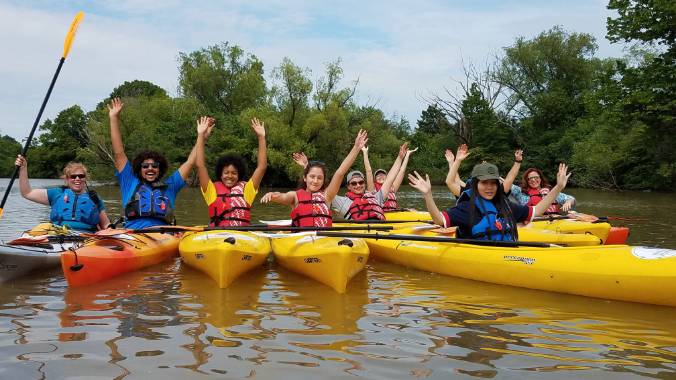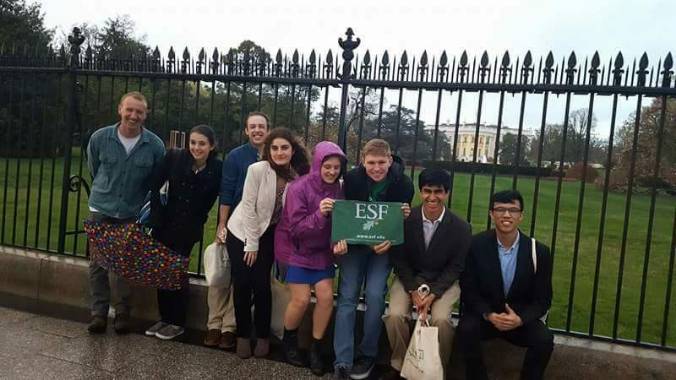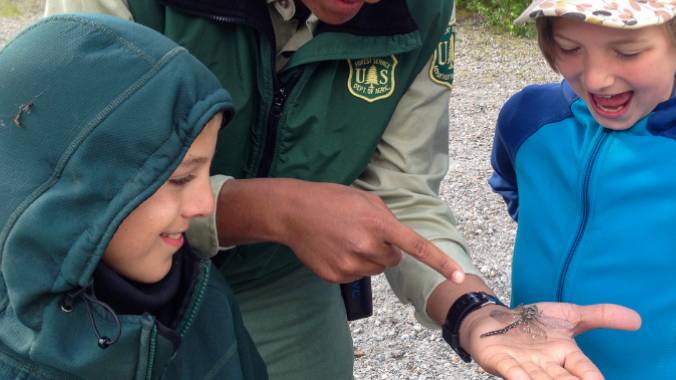DEPARTMENT OF Environmental Studies
Environmental Education and Interpretation
Discover and design impactful ways to connect diverse learners with science and natural and built environments so that they can collaborate to care for our places.
Environmental Education and Interpretation (EE&I) are inspiring professionals who work to help their learners take actions on important issues in conservation, environmental and social justice, climate change, park management and access, and resource management.
Our courses demonstrate the interconnectedness of environmental concerns.
Students will take courses that reflect the interdisciplinary and holistic nature of EE&I professions, and become well-grounded in field biology, ecology, and varied environmental sciences. Additional learning is in the social sciences, environmental studies, and humanities. This major inspires students to develop experiential education programs and materials that create meaningful learning for diverse audiences. These inclusive approaches foster environmental literacy, stewardship and community engagement in ways that create a more equitable, sustainable future.
Minors include: Environmental Policy and Communication, Recreation Resource and Protected Area Management, Environmental Writing and Rhetoric, Food Studies, Marine Science, and Renewable Energy.

Students gain real-world experiences in EE&I and experiential STEM teaching and learning.

Through a suite of environmental education and interpretation courses, students receive professional credentials in such programs as Project WILD, Project Learning Tree, and more. Courses provide opportunities to earn certifications from the National Association of Interpretation and to attend professional conferences. Additional opportunities exist in “nonpersonal” interpretation, where we carry out community engagement projects as co-learners with community partners, and where we create social media posts, digital storytelling tools, exhibition and wayfinding signs, and other forms of EE&I media. Students gain valuable work experiences through a professional internship, where their recently acquired knowledge and skills can be applied. ESF also operates the Adirondack Interpretive Center, where our students can learn and work.
New and emerging critical issues are woven into our program.
EE&I majors can take courses taught by faculty within the Center for Native Peoples and the Environment at ESF. There is also ample room in the curriculum for specialized courses about urban sustainability, climate justice, environmental health, or water issues. ESF offers several minors of interest to EE&I students, including Environmental Policy and Communication, Recreation Resource and Protected Area Management, Environmental Writing and Rhetoric, Food Studies, Marine Science, and Renewable Energy.
You can broaden your academic experience through a study abroad program. Whether you opt for a short-term immersion in another culture or a semester abroad, these opportunities offer valuable insights into global environmental issues. Engaging in study abroad programs allows you to explore diverse conservation methods, environmental justice initiatives, and sustainability practices worldwide. Additionally, you'll have the chance to connect with peers and professionals from various backgrounds, fostering cross-cultural understanding within the field.

We prepare students for employment in nonformal and informal education and interpretation.

Our alumni easily land positions in a wide array of places. Graduates have found richly satisfying careers in nature centers, zoos, aquaria, botanic gardens, parks, urban youth centers, early childhood learning programs, wilderness areas, federal and state agencies (such as the National Park Service or New York State Department of Environmental Conservation), non-profit organizations focused on conservation and/or environmental justice, museums, community gardens, and travel/ecotourism industries. A growing number of job postings exist doing media design and writing with private consulting companies, crafting graphic design work within agencies or organizations, and providing visitor information specially for social media or even film.
Our EE&I major can also serve as a valuable springboard to enter graduate programs in K-12 science teaching, early childhood nature education, or other formal education professions.
Environmental Education and Interpretation Degree Outcomes
EE&I students have an endless number of summer and short-term employment options, as well as entry-level career positions.
Career Options
- Park Ranger
- Environmental Educator
- Nature Interpreter
- Zoo, Aquarium, or Museum Educator
- STEM After-School Educator
- Outreach Program Coordinator
- Science Teacher
- Career and Technical Education Teacher
- Community Engagement Coordinator
- Visitor Information Specialist
- Interpretive Designer
- Early Childhood Nature Educator
